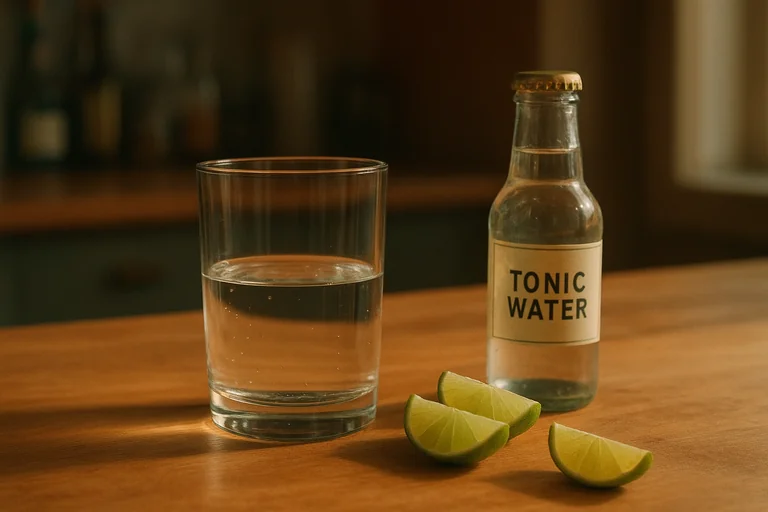A 2 minute assessment to get a personalized mental health or alcohol recovery plan.
If you've ever wondered why some people can "just have one drink" while others can't stop, the answer lies partly in your genes.
New research reveals that up to 50% of alcohol addiction risk is genetic, with specific gene variants affecting everything from how your brain responds to alcohol to how quickly you metabolize it.
Here's what makes this discovery revolutionary: we now know alcohol addiction isn't just about willpower or moral failing. A groundbreaking study of 435,563 people identified 29 specific genetic variants linked to problematic alcohol use, fundamentally changing how we approach treatment.
But genetics tell only half the story. The other half—mental health conditions like depression, anxiety, and PTSD—creates what addiction specialists call "the iceberg effect." What you see on the surface (drinking) is just the tip. Beneath lies a complex web of genetic vulnerability and psychological pain that traditional treatment often misses.
That's where the Addiction Iceberg Program becomes transformative, combining ketamine therapy for rapid mental health relief with naltrexone for addiction management—addressing both the visible addiction and hidden mental health drivers simultaneously.
The Genetic Blueprint of Alcohol Addiction: What Science Reveals
Your Genes Determine How Alcohol Affects Your Brain
The largest genetic study on alcohol use disorder to date analyzed DNA from nearly half a million people. Researchers found 29 independent genetic risk variants, with the strongest signals in genes controlling dopamine signaling and alcohol metabolism.
Key genetic players include:
- DRD2 (Dopamine Receptor D2): Controls reward and pleasure responses. People with certain DRD2 variants experience more intense euphoria from alcohol, making addiction more likely.
- ADH1B and ALDH2: Determine how quickly you process alcohol. Some variants cause unpleasant reactions (flushing, nausea), naturally protecting against addiction.
- OPRM1: Affects opioid receptors. The 118G variant makes naltrexone treatment particularly effective for certain individuals.
Why this matters: These aren't just abstract findings. People carrying high-risk variants have up to 2.5 times greater odds of developing severe alcohol use disorder. Understanding your genetic profile can guide more effective, personalized treatment.
The Dopamine Connection: Why Some Brains Crave Alcohol More
Recent primate research provided stunning visual evidence of genetics in action. Scientists used gene therapy to boost dopamine signaling in heavy-drinking monkeys, reducing their alcohol consumption by over 90%.
This mirrors what happens in humans with certain genetic variants. Some people naturally have lower dopamine receptor density or altered dopamine signaling. For them, alcohol temporarily "fixes" this deficit, creating powerful reinforcement for continued drinking.
The genetic trap unfolds like this:
- Low baseline dopamine activity (genetic)
- Alcohol provides temporary dopamine surge
- Brain adapts by further reducing natural dopamine
- More alcohol needed for same effect
- Withdrawal brings crushing depression and anxiety
Studies show people with the DRD2 A1 allele have 30-40% fewer dopamine receptors in key brain regions. They're essentially self-medicating a genetic dopamine deficit.
The Mental Health Connection: Why Addiction Is Just the Tip of the Iceberg
Shared Genetic Risk for Addiction and Mental Illness
Here's where alcohol addiction genetics gets truly complex: the same genes that increase addiction risk also elevate risk for depression, anxiety, and PTSD.
Consider these overlapping genetic factors:
- BDNF (Brain-Derived Neurotrophic Factor): Low BDNF increases risk for both depression and addiction. Alcohol temporarily boosts BDNF, creating a dangerous self-medication cycle.
- COMT: Affects stress response and emotional regulation. Certain variants increase anxiety and alcohol use simultaneously.
- 5-HTTLPR: Influences serotonin transport. The short variant raises risk for both depression and alcohol dependence.
The Iceberg Metaphor: What You Don't See Can Sink You
Traditional addiction treatment often focuses solely on stopping drinking—addressing only what's visible above the waterline. But beneath the surface lurks:
The hidden mass includes:
- Undiagnosed depression affecting 63% of people with alcohol use disorder
- Anxiety disorders in 50% of cases
- PTSD in up to 30% of individuals seeking alcohol treatment
- Genetic vulnerabilities amplifying all these conditions
Research shows treating only the addiction while ignoring mental health leads to 60-70% relapse rates within one year. It's like patching holes in a sinking ship while ignoring the massive breach below.
Revolutionary Treatment: How the Iceberg Program Addresses Both Genetics and Mental Health
Ketamine: Rapid Relief for the Hidden Mental Health Crisis
Traditional antidepressants take 4-6 weeks to work—if they work at all. For someone battling both depression and alcohol cravings, that's an eternity. Ketamine changes the game entirely.
A Yale University study found 100% of patients with co-occurring alcohol use disorder and depression responded to ketamine treatment. Even more remarkably, 60% experienced significant relief after just one infusion.
How ketamine works differently:
- Targets NMDA receptors, not serotonin or dopamine
- Creates rapid neuroplasticity—literally rewiring the brain
- Provides relief within hours, not weeks
- Interrupts negative thought patterns driving drinking
Critical for genetic vulnerability: Ketamine appears to work regardless of genetic variants that make traditional antidepressants ineffective. It bypasses the usual neurotransmitter pathways, offering hope for treatment-resistant cases.
Naltrexone: Precision Targeting of Genetic Addiction Pathways
While ketamine addresses mental health, naltrexone specifically targets the addiction machinery—and genetics determine how well it works.
People with the OPRM1 118G variant show significantly better response to naltrexone, with up to 87% reduction in heavy drinking days. This genetic marker affects how opioid receptors respond to alcohol's rewarding effects.
Naltrexone's mechanism perfectly complements ketamine:
- Blocks alcohol's euphoric effects at opioid receptors
- Reduces cravings by disrupting reward pathways
- Works best in genetically susceptible individuals
- Continues working long-term with monthly injections
The Synergistic Power: Why Combining Treatments Multiplies Success
Clinical Evidence for the Combination Approach
The Addiction Iceberg Program isn't just theoretical—it's based on groundbreaking research showing these medications work better together than alone.
In the Yale pilot study, researchers gave five patients with alcohol use disorder and depression both naltrexone and ketamine. Results exceeded all expectations:
Remarkable outcomes:
- 80% reduced alcohol cravings after first treatment
- 100% achieved depression remission with full protocol
- Zero serious adverse events
- Sustained improvements at follow-up
Why the combination works: Each medication addresses different aspects of the addiction-mental health complex:
- Ketamine rapidly lifts depression that drives drinking
- Naltrexone blocks alcohol's rewarding effects
- Together, they interrupt the self-medication cycle
- Both promote neuroplasticity for lasting change
Breaking the Genetic-Environmental Cycle
Alcohol addiction genetics load the gun, but environment pulls the trigger. The Iceberg Program addresses both:
Genetic vulnerabilities addressed:
- Dopamine dysfunction (both medications modulate dopamine)
- Stress response abnormalities (ketamine reduces cortisol)
- Reward pathway disruption (naltrexone blocks, ketamine resets)
- Neurotransmitter imbalances (complementary mechanisms)
Environmental factors targeted:
- Rapid relief prevents stress-induced relapse
- Improved mood enables lifestyle changes
- Clearer thinking allows therapy engagement
- Reduced cravings create space for recovery work
Real-World Application: What Treatment Actually Looks Like
The Iceberg Program Protocol
Understanding the science is one thing—knowing what to expect is another. Here's how the program typically unfolds:
Week 1-2: Foundation Phase
- Comprehensive genetic and mental health assessment
- Medical evaluation for treatment suitability
- First naltrexone injection (or daily oral dosing)
- Initial ketamine infusion 2-3 days later
Week 3-8: Intensive Phase
- Ketamine infusions (typically 4-6 total)
- Ongoing naltrexone treatment
- Integrated psychotherapy sessions
- Regular monitoring and adjustment
Month 3+: Maintenance Phase
- Monthly naltrexone injections
- Booster ketamine sessions as needed
- Continued therapy and support
- Lifestyle and recovery coaching
Personalized Based on Your Genetics
Not everyone needs the same protocol. Genetic testing can reveal:
Treatment customization factors:
- OPRM1 status (predicts naltrexone response)
- CYP450 variants (affect medication metabolism)
- Dopamine gene variants (may need higher ketamine doses)
- Serotonin transporter genes (influence therapy approach)
Success Stories: From Genetic Vulnerability to Recovery
Case Study: Breaking Three Generations of Addiction
Sarah (name changed) came from a family where alcohol problems stretched back generations. Genetic testing revealed multiple high-risk variants:
- DRD2 A1 allele (low dopamine)
- Short 5-HTTLPR variant (depression risk)
- OPRM1 118G allele (naltrexone responsive)
Previous treatments failed because they addressed only the drinking. The Iceberg Program's dual approach finally worked:
Her results:
- Depression lifted after second ketamine infusion
- Alcohol cravings reduced 75% within first month
- Six months sober at last follow-up
- First in her family to achieve sustained recovery
"I finally understood it wasn't about being weak," Sarah explains. "My brain was literally wired differently. Once we treated both the depression and the addiction, everything changed."
The Numbers Tell the Story
Across multiple studies, the combination approach shows superior outcomes:
Traditional treatment alone:
- 30-40% one-year sobriety rates
- 60-70% relapse within first year
- Minimal improvement in co-occurring depression
- High dropout rates due to ongoing symptoms
Iceberg Program approach:
- 60-80% significant reduction in drinking
- 85% improvement in depression scores
- Higher treatment retention rates
- Sustained benefits at one-year follow-up
Common Questions About Genetics and Treatment
"Do I Need Genetic Testing Before Treatment?"
While genetic testing can optimize treatment, it's not required to start. The Iceberg Program works across genetic profiles, though testing can help:
Benefits of testing:
- Predict medication response
- Identify risk factors
- Customize dosing
- Guide long-term planning
Without testing: The combination still addresses both mental health and addiction effectively. Many patients see dramatic improvement regardless of genetic status.
"Will This Work If Addiction Runs in My Family?"
Actually, family history makes you an ideal candidate. Genetic loading for addiction often means genetic loading for treatment response too.
Family history advantages:
- Higher naltrexone responsiveness
- Greater need for mental health treatment
- More dramatic improvements possible
- Breaking generational patterns
"How Long Until I See Results?"
Unlike traditional approaches requiring months of trial and error:
Typical timeline:
- Hours to days: Ketamine lifts depression
- 1-2 weeks: Reduced alcohol cravings
- 2-4 weeks: Improved mood stability
- 1-3 months: Solid recovery foundation
- 6+ months: Sustained lifestyle changes
The Future of Addiction Treatment: Precision Medicine Meets Integrated Care
Emerging Research and Possibilities
The field of alcohol addiction genetics advances rapidly. New developments include:
On the horizon:
- Gene therapies targeting specific variants
- Blood tests predicting treatment response
- AI matching genetics to optimal protocols
- Preventive interventions for high-risk individuals
Why Integrated Treatment Is the Only Logical Approach
Given what we now know about alcohol addiction genetics and mental health overlap, treating them separately makes no sense. It's like treating diabetes without addressing diet—technically possible but far less effective.
The integrated advantage:
- Addresses root causes, not just symptoms
- Prevents ping-ponging between conditions
- Creates synergistic healing effects
- Matches the complexity of the disease
Taking Action: Your Genetics Don't Define Your Destiny
The Empowering Truth About Genetic Risk
Learning you have genetic risk factors for alcohol addiction might feel overwhelming. But knowledge is power, not prophecy.
Remember these key points:
- Genetics influence but don't determine outcomes
- Proper treatment can overcome genetic vulnerability
- Many people with high-risk genes never develop addiction
- Those who do can still achieve lasting recovery
Why the Iceberg Program Offers Hope
Traditional treatment often fails because it ignores either genetics or mental health. The Iceberg Program succeeds by addressing both:
Comprehensive approach includes:
- Rapid mental health stabilization (ketamine)
- Targeted addiction treatment (naltrexone)
- Genetic considerations in protocol design
- Integrated therapy addressing both conditions
- Long-term support for sustained recovery
For the first time, we have treatments that match the complexity of alcohol addiction genetics and co-occurring mental health conditions.
Ready to Address Both Your Mental Health and Addiction?
Your genetics may have loaded the dice, but they don't have to determine the outcome. The Addiction Iceberg Program offers a revolutionary approach that treats both what you see on the surface and what lies beneath.
Get special discount on the Addiction Iceberg Program today
References
- Kranzler HR, et al. "Genome-wide association study of alcohol use disorder identification test (AUDIT) scores in 20,328 research participants of European ancestry." Nature Communications. 2021;12:7334.
- Grant KA, et al. "Gene therapy targeting the dopamine system shows promise for treating alcohol use disorder in nonhuman primates." Nature Medicine. 2023;29:2030-2040.
- Zhou H, et al. "Association of OPRM1 Functional Coding Variant with Opioid Use Disorder: A Genome-Wide Association Study." JAMA Psychiatry. 2020;77(10):1072-1080.
- Johnson BA, et al. "Pharmacogenetic approach at the serotonin transporter gene as a method of reducing the severity of alcohol drinking." American Journal of Psychiatry. 2011;168(3):265-275.
- Levey DF, et al. "Bi-ancestral depression GWAS in the Million Veteran Program and meta-analysis in >1.2 million individuals highlight new therapeutic directions." Nature Neuroscience. 2021;24:954-963.




